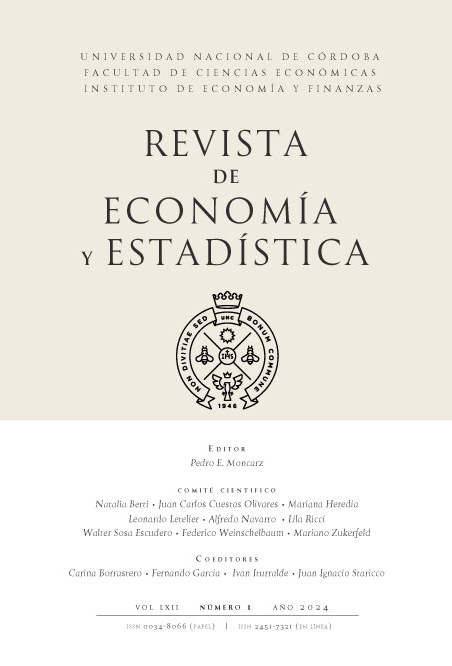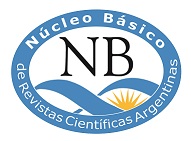Towards a new generation of incubators? Conceptual debate on their role in sustainable transition
DOI:
https://doi.org/10.55444/2451.7321.2024.v62.n1.46540Keywords:
Business incubators, Intermediaries, Sustainable business model, Sustainable transition, EntrepreneurshipAbstract
The social, environmental, and economic tensions of the 21st century highlight the urgent need to rethink development and assess how ecosystem actors support or obstruct the transition to more sustainable systems. Notably, while established companies are increasingly pressured to adopt sustainable models, entrepreneurship and innovation ecosystems still prioritize economic and financial sustainability for emerging businesses. This paper explores this issue, focusing on business incubators and emphasizing their role as intermediary organizations. Given their position within the ecosystem, incubators can drive the transition in two key ways: by fostering new forms of exchange among ecosystem actors and by nurturing a new generation of ventures designed to be sustainable from the outset. Addressing these questions is particularly important, as without a clear commitment to sustainability, incubators risk perpetuating unsustainable business models.
Reception date: 30/09/2024
Acceptance date: 11/12/2024
Downloads
References
Abdelkafi, N., y Täuscher, K. (2015). Business Models for Sustainability from a System Dynamics Perspective. Organization & Environment, 29(1), 74–96.
Amato, C. (2015). Relación entre sustentabilidad, responsabilidad social y responsabilidad extendida al productor. Consejo Nacional de Investigaciones Científicas y Técnicas, 4.
Bank, N., y Kanda, W. (2017). Tenant recruitment and support processes in sustainability-profiled business incubators. Industry and Higher Education, 30(4), 267–277.
Baraldi, E., y Ingemansson Havenvid, M. (2016). Identifying new dimensions of business incubation: A multi-level analysis of Karolinska Institute’s incubation system. Technovation, 50-51, 53–68.
Barbero, J. L., Casillas, J. C., Ramos, A. y Guitar, S. (2012). Revisiting incubation performance. Technological Forecasting and Social Change, 79(5), 888–902.
Baskaran, A., Chandran, V., y Ng, B.-K. (2019). Inclusive Entrepreneurship, Innovation and Sustainable Growth: Role of Business Incubators, Academia and Social Enterprises in Asia. Science, Technology and Society, 24(3), 385-400.
Battilana, J., Sengul, M., Pache, A.C. y Model, J. (2014). Harnessing Productive Tensions in Hybrid Organizations: The Case of Work Integration Social Enterprises. Academy of Management Journal, 58(6), 1658-1685.
Bergek, A. y Norrman, C. (2008). Incubator best practice: A framework. Technovation, 28(1-2), 20–28.
Blanco Jiménez, F. J., Asensio Ciria. A., Esteban Escobar, D., Fernández Fernández M.T., Santos Bartolomé J.L., Polo García-Ochoa C. y Aguirre Quezada J.C. (2021). Los servicios que prestan los viveros y aceleradoras de empresas en España. Ranking 2021/2022. FUNCAS, Ed. FUNCAS.
Bruneel, J., Ratinho, T., Clarysse, B. y Groen, A. (2012). The Evolution of Business Incubators: Comparing demand and supply of business incubation services across different incubator generations. Technovation, 32(2), 110–121.
Carayannis, E. G., y Campbell, D. F. J. (2009). Open innovation diplomacy and the quadruple helix: A new model for the knowledge economy. Journal of Innovation and Entrepreneurship, 1(1), 1-12.
Carayannis, E. G., y von Zedtwitz, M. (2005). Architecting gloCal (global–local), real-virtual incubator networks (G-RVINs) as catalysts and accelerators of entrepreneurship in transitioning and developing economies: lessons learned and best practices from current development and business incubation practices. Technovation, 25(2), 95–110.
Carayannis, E.G., Barth, T.D. y Campbell, D.F. (2012). The Quintuple Helix innovation model: global warming as a challenge and driver for innovation. Journal of Innovation and Entrepreneurship 1(2).
Chesbrough, H. (2003). Open innovation: The new imperative for creating and profiting from technology. Harvard Business Press.
Codner, D., Baudry, G. y Becerra, P. (2013). Las oficinas de transferencia de conocimiento como instrumento de las universidades para su interacción con el entorno. Universidades, 58, 24-32. Unión de Universidades de América Latina y el Caribe. Distrito Federal.
Comisión Europea (2010). The smart guide of innovation–based incubators. Regional Policy. Recuperado el 26 de Septiembre de 2024 de: https://ec.europa.eu/regional_policy/en/information/publications/evaluations-guidance-documents/2010/the-smart-guide-to-innovation-based-incubators-ibi.
Deyanova, K., Brehmer, N., Lapidus, A. et al. (2022). Hatching start-ups for sustainable growth: a bibliometric review on business incubators. Review of Managerial Science, 16, 2083–2109.
Dhiman, V. y Arora, M. (2024). Exploring the linkage between business incubation and entrepreneurship: understanding trends, themes and future research agenda. LBS Journal of Management & Research, 22(1), 66-92.
Dutt, N., Hawn, O., Vidal, E., Chatterji, A., McGahan, A. y Mitchell, W. (2016). How open system intermediaries address institutional failures: The case of business incubators in emerging-market countries. Academy of Management Journal, 59(3), 818–840.
Etzkowitz, H. y Leydesdorff, L. (1995). The Triple Helix. University-Industry-Government Relations: A laboratory for knowledge-based economic development. EASST Review, 14, 14–19.
Ferlito, R. y Faraci, R. (2022). Business model innovation for sustainability: a new framework. Innovation & Management Review, 19(3), 222–236.
Fernández de Lucio, I., Castro, E., Conesa, F., y Gutiérrez, A. (2000). Una visión crítica de las relaciones universidad-empresa: el papel de las estructuras de interrelación. Instituto de Gestión de la Innovación y del Conocimiento, Universidad Politécnica de Valencia. Recuperado el 28 de Julio de 2023 de:
https://digital.csic.es/bitstream/10261/132484/1/relacionesuni-empre.pdf
Fernández de Lucio, I., Conesa, F., Garea, M., Castro, E., Gutiérrez, A., y Bodegas, M.A. (1996). Estructuras de interfaz en el Sistema español de Innovación. Su papel en la difusión de tecnología. Centro de Transferencia de Tecnología. Universidad Politécnica de Valencia.
Gabarret, I., y D’Andria, A. (2021). Improving gender equality through entrepreneurship: The role of women-dedicated business incubators. Journal of the International Council for Small Business, 2(2), 79–89.
Galbraith, B., McAdam, R., y Cross, S. E. (2019). The Evolution of the Incubator: Past, Present, and Future. IEEE Transactions on Engineering Management, 68(1), 265–271.
Global Business Incubation (GBI). (s.f.). Recuperado el 19 de Septiembre de 2024 de https://gbiinc.org/global-business-incubation-gbi
Granstrand, O., y Holgersson, M. (2019). Innovation ecosystems: A conceptual review and a new definition. Technovation, 90-91, 102098.
Gregori, P., Holzmann, P., y Audretsch, D. B. (2024). Sustainable entrepreneurship on digital platforms and the enactment of digital connectivity through business models. Business Strategy and the Environment, 33(2), 1173–1190.
Hackett, S. M., y Dilts, D. M. (2004). A Systematic Review of Business Incubation Research. The Journal of Technology Transfer, 29(1), 55–82.
Hargreaves, T., Hielscher, S., Seyfang, G., y Smith, A. (2013). Grassroots innovations in community energy: The role of intermediaries in niche development. Global Environmental Change, 23(5), 868–880.
Hernández, R., y Carrà, G. (2016). A Conceptual Approach for Business Incubator Interdependencies and Sustainable Development. Agriculture and Agricultural Science Procedia, 8, 718–724.
Ho, J.-Y., y Yoon, S. (2021). Ambiguous roles of intermediaries in social entrepreneurship: The case of social innovation system in South Korea. Technological Forecasting and Social Change, 175.
Howells, J. (2006). Intermediation and the role of intermediaries in innovation. Research Policy, 35(5), 715–728.
Jacobsson, S.B., y Bergek, A. (2011). Innovation system analyses and sustainability transitions: contributions and suggestions for research. Environmental Innovation and Societal Transitions, 1, 41–57.
Kivimaa, P. (2014). Government-affiliated intermediary organisations as actors in system-level transitions. Research Policy, 43(8), 1370–1380.
Kivimaa, P., Boon, W., Hyysalo, S., y Klerkx, L. (2019). Towards a typology of intermediaries in sustainability transitions: A systematic review and a research agenda. Research Policy, 48(4), 1062–1075.
Kreiling, L., Serval, S., Peres, R. y Bounfour, A. (2019). University technology transfer organizations: Roles adopted in response to their regional innovation system stakeholders. Journal of Business Research, 119, 218–229.
Laukkanen, M., y Patala, S. (2014). Analysing barriers to sustainable business model innovations: innovation systems approach. International Journal of Innovation Management, 18(06), 1440010.
Leitão, J., Pereira, D., y Gonçalves, A. (2022). Business Incubators, Accelerators, and Performance of Technology-Based Ventures: A Systematic Literature Review. Journal of Open Innovation: Technology, Market, and Complexity, 8, 46.
Lüdeke-Freund, F., Wells, P., Aagaard, A. (2024). The Catalytic Role of Sustainability Transitions for Business Models. En Aagaard, A. (Ed.) Business Model Innovation. Palgrave Macmillan, Cham.
Marlow, S., y McAdam, M. (2015). Incubation or Induction? Gendered Identity Work in the Context of Technology Business Incubation. Entrepreneurship Theory and Practice, 39(4), 791–816.
Marques, S. C., Saba, H., Winkler I. y Nascimento, A. S. (2022). Business Incubators and Sustainability: A Literature Review. International Journal of Advanced Engineering Research and Science, 9(9), 471–482.
Millette, S., Eiríkur Hull, C., y Williams, E. (2020). Business Incubators as effective tools for driving circular economy. Journal of Cleaner Production, 266, 121999.
National Business Incubation Association (NBIA). (s.f.). Recuperado el 1 de Diciembre de 2024 https://www.inc.com/encyclopedia/national-business-incubation-association-nbia.html.
Negro-Hang, F. (2022). Tres elementos para pensar críticamente las políticas de vinculación: analizando el caso de las incubadoras de empresas universitarias. Integración y Conocimiento, 11(2), 45–61.
Peters, L., Rice, M. y Sundararajan, M. (2004). The Role of Incubators in the Entrepreneurial Process. Journal of Technology Transfer, 29(1), 83–91.
Phan, P. H., Siegel, D. S. y Wright, M. (2005). Science parks and incubators: Observations, synthesis and future research. Journal of Business Venturing, 20(2). 165–182.
Presenza, A., Messeni Petruzzelli, A., y Natalicchio, A. (2019). Business Model Innovation for Sustainability. Highlights from the Tourism and Hospitality Industry. Sustainability, 11(1), 212.
Reyes, C., y Neergaard, H. (2023). Feminist perspectives on gender and technology entrepreneurship in incubator settings. International Journal of Gender and Entrepreneurship, 15(1), 64–93.
Rice, M. y Matthews, J. (1995). Growing New Ventures, Creating New Jobs: Principles and Practices of Successful Business Incubation. Westport: Quorum Books.
Sabato, J. (1979). Ensayos en campera. Buenos Aires, Argentina: Juárez.
Schot, J., y Steinmueller, W. E. (2018). Three frames for innovation policy: R&D, systems of innovation and transformative change. Research Policy, 47(9), 1554–1567.
Shepard, J. M. (2013). Small business incubators in the USA: a historical review and preliminary research findings. Journal of Knowledge-Based Innovation in China, 5(3), 213–233.
Shepard, J. M. (2017). When incubators evolve: new models to assist innovative entrepreneurs. International Journal of Entrepreneurship and Innovation Management, 21(1/2), 86.
Shih, T. y Aaboen, L. (2019). The network mediation of an incubator: How does it enable or constrain the development of incubator firms’ business networks? Industrial Marketing Management, 80, 126–138.
Sistema B Argentina. (9 de diciembre de 2024). ¿Cómo ser Empresa B Certificada? https://www.sistemab.org/ser-b/
Sohail, K., Belitski, M., y Castro Christiansen L. (2023). Developing business incubation process frameworks: A systematic literature review. Journal of Business Research, 162, 113902.
Surana, K., Singh, A. y Sagar, A. D. (2020). Strengthening science, technology, and innovation-based incubators to help achieve Sustainable Development Goals: Lessons from India. Technological Forecasting and Social Change, 157, 120057.
Downloads
Published
Issue
Section
License
Copyright (c) 2024 Frida Negro-Hang

This work is licensed under a Creative Commons Attribution-NonCommercial-NoDerivatives 4.0 International License.
Authors who have publications with this journal agree to the following terms:
Authors retain their copyright and grant the journal the right of first publication of their work, which is simultaneously subject to the Creative Commons Attribution-NonCommercial-NoDerivatives 4.0 International License that allows third parties to share the work provided that its author and first publication in this journal are indicated.
Authors may adopt other non-exclusive licensing arrangements for distribution of the published version of the work (e.g. depositing it in an institutional telematic archive or publishing it in a monographic volume) as long as the initial publication in this journal is indicated.
Authors are allowed and encouraged to disseminate their work via the Internet (e.g. in institutional telematic archives or on their website) before and during the submission process, which can lead to interesting exchanges and increase citations of the published work. (See The Open Access Effect)














